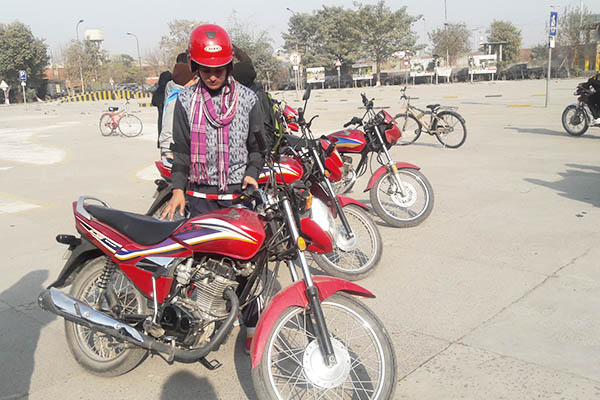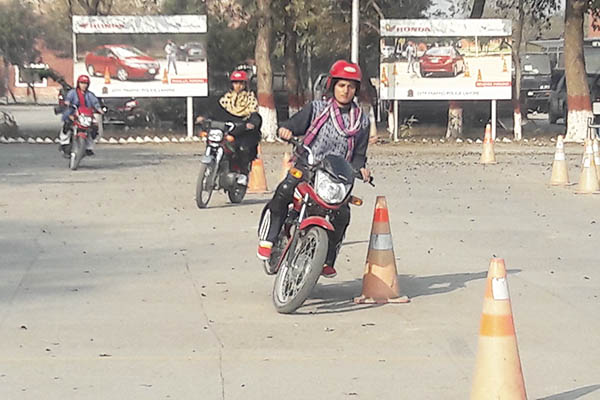
Police in Lahore want the city’s women to reclaim public spaces—by learning how to drive motorcycles.
Women in Pakistan face significant challenges. Honor killings, forced marriages and sexual harassment are among the worst, and most visible, offenses, but the pervasive misogyny is no less prominent on the country’s roads, where men can often deride and harass women drivers, prompting many to seek male ‘protection’ while driving. The harassment tends to be worst for women on bicycles or motorcycles, traditionally considered “men only” vehicles. The sight of women on motorcycles is so rare that images of women on public roads have gone viral on social media amid calls for greater government support for the “pioneers.” The Special Monitoring Unit (Law and Order), in collaboration with City Traffic Police Lahore and U.N. Women—an organization dedicated to gender equality—hopes to achieve this with Women on Wheels, Pakistan’s first government-sponsored training program for women who want to ride motorcycles.
“We [the Punjab government] want to make sure that women feel empowered” and at par with men, says Salman Sufi, the head of the law and order wing. By training them to ride motorcycles, which are a much cheaper alternative to cars, women can become more independent, he added. To start off, 150 women are being trained by the City Traffic Police at their Thokar Niaz Baig office. Imtiaz Rafiq, who is supervising the lessons, says over 60 women have been trained in the past three weeks using motorcycles donated by Honda.
The training process is designed to ensure even complete novices can achieve mastery of the vehicle within a few weeks, says Lady Traffic Warden Sidra Saleem. Each class starts with the basics of learning how to achieve balance on a bicycle. Once this has been achieved, they are taught the basics of ABC: Acceleration, Brake and Clutch, using actual motorcycles. In addition to informing the trainees about traffic rules and the basics of driving, says Saleem, the women are also taught how to overcome common problems encountered by motorcyclists.
Farida Khanum, 40, recently joined the City Traffic Police’s class. A writer by profession, she told Newsweek she had often faced conveyance issues that had forced her to quit several jobs. Thanks to the government’s initiative, she says, she is determined to secure a motorcycle license to secure more control over her own life.

Any woman can sign up for the training, says Sufi. Interested candidates can email the Special Monitoring Unit with their phone and National Identification Card numbers. The SMU team will then respond with details on the classes available. To facilitate the trainees, the classes are not restricted to specific hours, and even working women can sign up for classes after work. Sufi says the initial response has been very positive, with women of diverse backgrounds hoping to become motorcyclists. The first class includes housemaids, engineers, students, homemakers and even members of media, he added.
But while the Punjab government’s plan to achieve parity between men and women is laudable, it won’t be easy. In 2008, the government deployed a team of female traffic wardens on motorcycles in an effort to encourage the organic growth of women on Lahore’s streets. The initiative proved a failure, which Sufi attributes to poor planning. “There were too few women [eight in the first batch] and were outnumbered by male traffic wardens. People weren’t ready. They were harassed and insulted,” he says.
This time, says Sufi, the government hopes to combat the aversion to change through the weight of numbers. “If there are 50 women on the road, how many can men harass?” says Sufi. He says the government is also developing a smartphone app to help women in trouble. Once completed, the app will transmit the location of any woman being harassed to the nearest traffic warden, who will be required to help her immediately.
But Sufi admits that the change must start with the men. He says the government has planned media campaigns to educate men about the importance of encouraging women drivers. Harassers will also be dealt with harshly, he added, without offering specifics.
In a positive sign of changing societal attitudes, several trainees told Newsweek their families, including the men, have encouraged their decision to ride motorcycles. A mother of three said she often practices her driving with her teenage son in tow. Iffat Tariq, a 29-year-old trainee, said she has even driven her brother several times.
As a public show of support, the government has announced a ‘motorcycle rally’ on Jan. 10, in which trainer Rafiq hopes 50-60 of his students will participate to establish their presence on Lahore’s streets. To commemorate the occasion, Punjab Chief Minister Shahbaz Sharif is due to announce 1,000 subsidized—50 percent of the cost will be paid by the government—scooters for women, with a focus on women under 40 to encourage the next generation and contribute toward Pakistan’s development.
If the event proceeds as planned, women on motorcycles may soon become as ubiquitous as men—bringing Pakistan one step closer to true gender parity.

2 comments
That is the best thing that ever happened to woman in Pakistan. Bravo Govt of Punjab.
I have been driving in Karachi for last 30 years and have had great support from fellow drivers on roads – except motor cycle drivers are a menace who overtake you from the wrong side. I must also admit here despite being a driver for long time I cannot change tires and have great regards for taxi and rickshaw drivers who have helped me in the time of distress. Karachi roads are not really “gendered” especially in day light but presently night driving is not recommended for women.